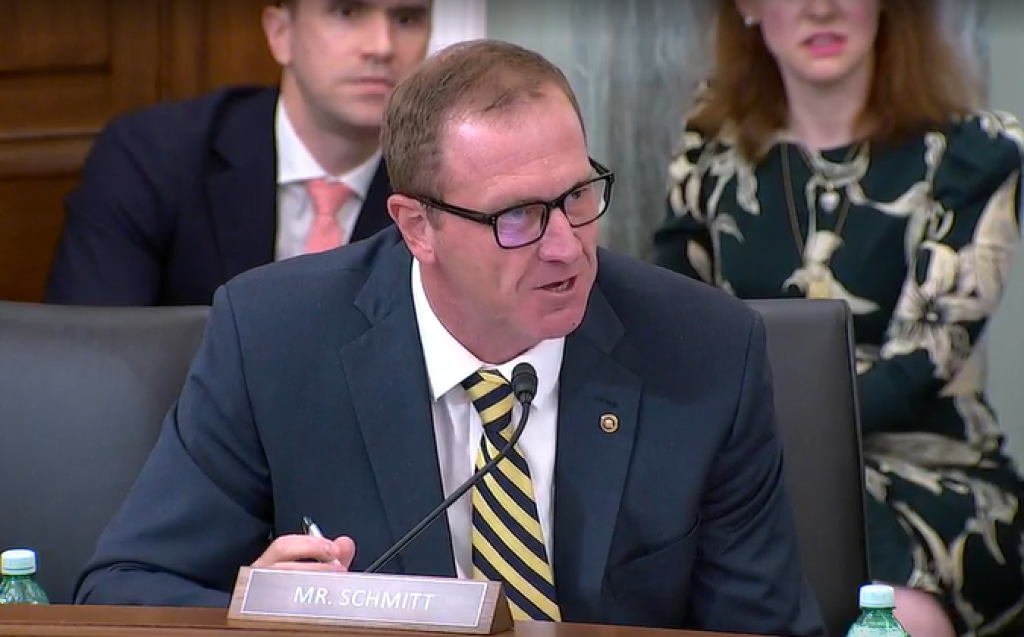Rosenworcel's AI Ad Disclosure Plan Survives Senate Test
'This is like a hair-on-fire moment,' Sen. Amy Klobuchar, D-Minn., said.
Michael D. Melero

WASHINGTON, August 2, 2024 – Sen. Eric Schmitt, R-Mo., this week lost a battle in the Senate Commerce Committee to block Federal Communications Commission Chairwoman Jessica Rosenworcel's plan to require disclosure of the use of artificial intelligence technology in political ads on radio and television.
Rosenworcel's proposal was strongly opposed by FCC Republicans Brendan Carr and Nathan Simington, who claimed the agency was engaging in political interference with less than 100 days to the November elections.
Republican hostility to Rosenworcel's plan flared up again Wednesday at the Senate Commerce Committee's executive session, where lawmakers also passed two broadband bills and several AI bills where it appeared agreement had been reached well in advance.
At the session, Schmitt offered an amendment to shut down Rosenworcel's AI ads plan, saying the FCC "has no legal authority at all to impose controls on political speech" and that "this is a very dangerous road to go down in my view."
Schmitt added, "We should not be empowering an agency that has no legal authority to censor political speech just in time for the 2024 general election."
On July 25, the FCC announced that it would launch a Notice of Proposed Rulemaking incorporating Rosenworcel's proposal. NPRMs pushed by the FCC's leader usual result in the adoption of new regulations.
As the Senate panel was debating Schmitt's amendment, the FCC's Office of Media Relations emailed a "Fact Sheet" on the details of Rosenworcel's proposal. Rosenworcel has insisted that AI ad disclosure wasn't censorship.
Sen. Amy Klobuchar, D-Minn, defended the approach to AI ads advanced by the FCC's Democratic leader.
"This is like a hair-on-fire moment," she said. "If anything, the last thing we want to do when we don't have any set rules in place on AI is take away the authority of the Federal Election Commission (FEC) or the FCC to be able to continue to do their job."
Schmitt countered, "The FEC has come out and said the FCC has no legal authority." He was referring to a June 3 letter to Rosenworcel from FEC Chairman Sean Cooksey.
Schmitt's amendment was defeated, 14-12, by the Democratic-controlled committee.
In other action, the Committee passed two broadband bills:
◾ The PLAN for Broadband Act (S. 2238), which would require the Biden administration to develop a national strategy to close the digital divide and a plan to implement that strategy. The bill was a response to a May 2023 Government Accountability Office report that found that federal broadband efforts were “fragmented and overlapping, with more than 133 funding programs administered by 15 agencies.” In May, the House passed its own PLAN Act introduced by Reps. Tim Walberg, R-Mich., and Annie Kuster, D-N.H.
◾ The Rural Broadband Protection Act (S.275), which would require the FCC to establish a thorough vetting and verification process to ensure that Internet Service Providers that receive federal support have “a proven track record of success and have demonstrated sound judgment in deploying in hard-to-serve areas.” The RBPA would apply to ISPs receiving funds from the FCC’s high-cost program within the $8.1 billion Universal Service Fund.
The panel also passed several AI-related bills, including:
◾ The Future of Artificial Intelligence Innovation Act (S.4178), which would authorize an Artificial Intelligence Safety Institute to assist the private sector in developing voluntary standards for AI. The institute would conduct research, develop voluntary guidance and best practices for AI, and engage with the private sector to promote AI innovation and competitiveness.
◾ The National Science Foundation AI Education Act (S. 4349), which would establish a nationwide outreach program to bring AI education to elementary and secondary schools in addition to career and technical education centers; and
◾ The CREATE AI Act (S.2714), which would authorize the creation of a National Artificial Intelligence Research Resource, overseen by the National Science Foundation. The resource would provide free or low-cost computational and data resources needed to do AI research that is accessible by educational and business institutions.









Member discussion